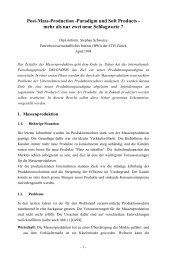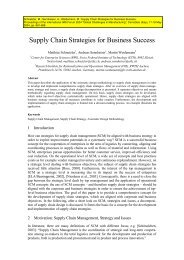The China Venture
The China Venture
The China Venture
Create successful ePaper yourself
Turn your PDF publications into a flip-book with our unique Google optimized e-Paper software.
forms a sharp contrast to Western civilisations, where the secular and religious powers and the<br />
legal system co-existed and fostered a tradition of plurality and supremacy of law. <strong>The</strong><br />
difficulty in today’s <strong>China</strong> to accept the supremacy of law may be considered as a<br />
consequence of Traditional Chinese Law.<br />
Criminal law formed the backbone of the traditional legal system. As a result, all types of<br />
litigation were subject to criminal procedures and law was generally viewed as a cruel<br />
instrument of suppression. <strong>The</strong> concept of private law reflecting the spirit of market<br />
exchange s among equal persons has never appeared in the traditional legal system. This again<br />
forms a sharp contrast to Western legal tradition, which is based to a great extent on private<br />
law. <strong>The</strong> lack of private law in Traditional Chinese Law and the dominance of criminal law<br />
may to a certain extent serve as an explanation of the generally hostile attitude towards<br />
litigation in contemporary <strong>China</strong>.<br />
Traditional Chinese Law did not know the formal separation of the judicial branch.<br />
Administrative officials exercised both the power of administration and the power of<br />
adjudication. <strong>The</strong> typical format of a traditional litigation was an inquisitional process backed<br />
by physical torture to obtain a confession. <strong>The</strong>refore, the traditional concept was that justice<br />
cannot be found in law, but from the intelligence and honesty of individual officials. This may<br />
serve as an explanation of the still widespread distrust in the official judicial structure. As a<br />
consequence, justice is often searched for outside the formal procedure in today’s <strong>China</strong>.<br />
<strong>The</strong> above features overshadow the generally accepted positive values of Traditional Chinese<br />
Law such as the mixed system of codification and precedents, the emphasis on the educational<br />
function of law, the rich experience in legal practice, and the function of law in stabilising<br />
social harmony. Still, the traditional legal system constituted an insurmountable obstacle in<br />
the historical course of transition towards modernisation. It had to be abolished in order to<br />
transit to a new era of Chinese legal development.<br />
2.2.1.2 Modern Chinese Law<br />
In order to cope with the development of the fledgling modern national economy, the Qing<br />
Dynasty promulgated reforms of the legal system in the early 20 th century. <strong>The</strong> major laws<br />
enacted at that time were all based on German, French and Japanese law. This modelled the<br />
new Chinese legal system according to civil law tradition. <strong>The</strong> following reasons caused the<br />
introduction of civil rather than common law.<br />
8






